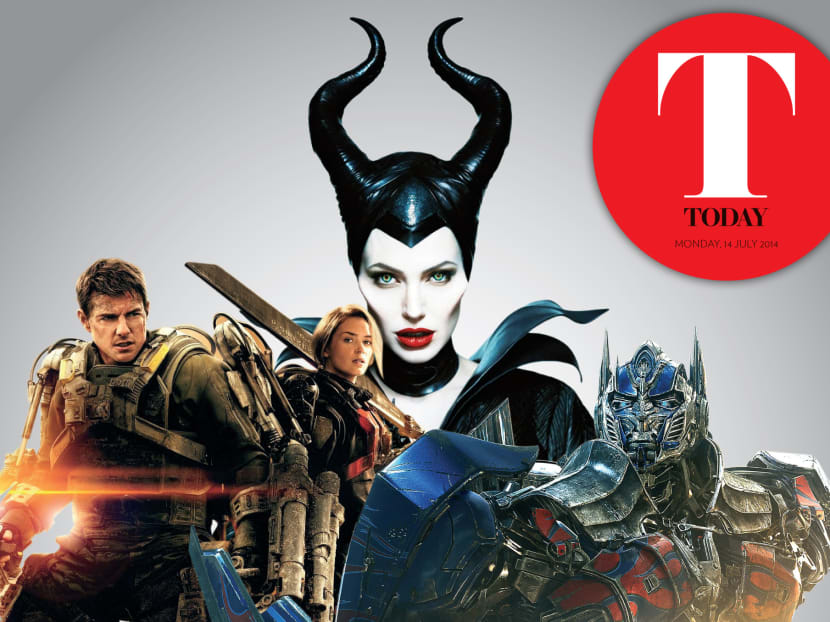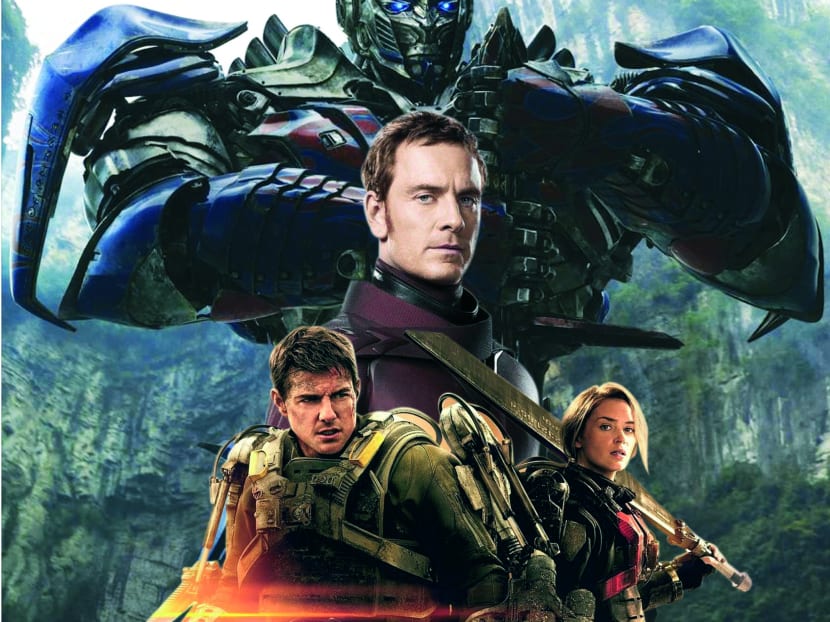Slow summer for blockbusters
Hollywood’s summer at the box office isn’t just missing nearly 20 per cent of last summer’s revenue — it’s also lacking swagger.


Hollywood’s summer at the box office isn’t just missing nearly 20 per cent of last summer’s revenue — it’s also lacking swagger.
Summer is the season for mega-budget, chest-thumping, globe-trotting films so big they lure droves of cinemagoers with heavily promoted promises of shock and awe. But this season’s blockbuster output has been curiously low on the summer’s stock in trade: Bigness.
Two months in, and there haven’t been any $300-million grossers at the North American box office. The only movie to surpass US$100 million (S$124 million) in its weekend debut was Transformers: Age Of Extinction, and it did so by such a small smidge that some box-office watchers claimed it was artificially inflated. The United States’ Fourth of July weekend, the customary launching pad for some of Hollywood’s flashiest fireworks, was the worst weekend in at least a decade.
“The first half of the year was extremely strong, as was last year,” said Dan Fellman, domestic distribution head for Warner Bros. “Then all of a sudden, it turned the other way.”
Since kicking off in early May, the summer box office has totalled US$2.25 billion, a 19.3 per cent downturn from last year. Propelled by hit sequels such as Iron Man 3 and Despicable Me 2, last year was a record summer at the box office, despite a series of high-profile bombs such as The Lone Ranger, White House Down and After Earth.
But while Hollywood’s summer has featured no shortage of major blockbusters, the box office has been dragged down, not so much by flops, but by a slate of more modestly ambitious movies. The only major new July 4 release was the Melissa McCarthy comedy Tammy, made for just US$20 million (it debuted with US$21.6 million). One of the season’s biggest sensations, The Fault In Our Stars, was a niche-based hit that appealed to the ardent fans of John Green’s young-adult book. A whopping 82 per cent of its US$48 million opening weekend was female. The ensemble comedy sequel Think Like A Man Too topped a weekend in June with US$29.2 million, despite little crossover appeal.
These movies will probably all be quite profitable for their respective studios due to their cost-conscious budgets. But they aren’t superhero-sized hits. Many of the blockbusters have seen revenue quickly tumble after the first weekend or two. Transformers nosedived 63 per cent in its second weekend. X-Men: Days Of Future Past opened big with US$90.8 million but slid 64 per cent the following week. Godzilla bowed in with US$93.2 milliononly to drop 67 per cent.
Large declines aren’t uncommon — so much of the marketing push is for opening weekend. But such steep fall-offs contribute to anxiety over the ability of movies to capture and hold the attention of moviegoers in an age of so many other entertainment options. DreamWorks’ How To Train Your Dragon 2 was set up to be the big animated option of the summer following the popularity of the Oscar-nominated original. But it has seen an oddly muted reception, thus far totalling US$141.7 million in North America, well below the US$368 million domestic haul of Despicable Me 2. DreamWorks Animation head Jeffrey Katzenberg has been cynical about the movie industry of late, calling it “not a growth business”.
Instead, the studios have been banking on their biggest growth coming from overseas markets. Transformers emphasised the China market more than North America. It launched its global assault from there and it was rewarded by becoming China’s all-time top box-office film, with US$223 million in just two weeks. Angelina Jolie’s Maleficent has brought in US$416 million internationally, while the Tom Cruise film, Edge Of Tomorrow has nearly tripled its domestic total: US$91.4 million in America as opposed to US$248.6 million abroad.
“We’re in a global business today and if we lose a little ground in the domestic marketplace, we can pick it up internationally,” said Fellman.
But overseas business is little use for North American theatres, with Fellman noting the exhibitors “that are really suffering this summer”. Yet because of a strong spring led by Captain America: The Winter Soldier and The Lego Movie (the year’s top two releases so far), the total 2014 American box office is down only 3.9 per cent from last year.
“We have Dawn Of The Planet Of The Apes and Guardians Of The Galaxy,” said Paul Dergarabedian, senior media analyst for box-office tracker Rentrak. “Luckily, there are what I think will be solid performers on the way. The summer is not over.”
But, really, most of the optimism now has shifted to 2015, when Marvel’s Avengers: Age Of Ultron may become the highest grossing movie of all time. There’s a general sentiment that the summer of 2014 is simply an in-between summer. “Ultimately,” said Dergarabedian, “it does come down to the product.” AP





